高中英语所有从句大全
高考英语从句综合知识点
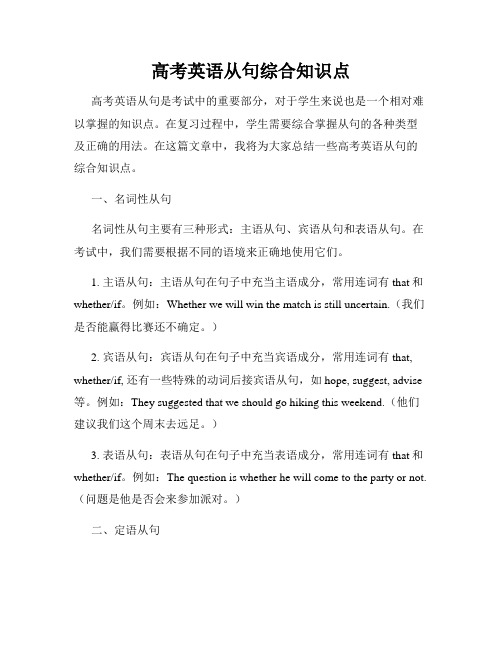
高考英语从句综合知识点高考英语从句是考试中的重要部分,对于学生来说也是一个相对难以掌握的知识点。
在复习过程中,学生需要综合掌握从句的各种类型及正确的用法。
在这篇文章中,我将为大家总结一些高考英语从句的综合知识点。
一、名词性从句名词性从句主要有三种形式:主语从句、宾语从句和表语从句。
在考试中,我们需要根据不同的语境来正确地使用它们。
1. 主语从句:主语从句在句子中充当主语成分,常用连词有that和whether/if。
例如:Whether we will win the match is still uncertain.(我们是否能赢得比赛还不确定。
)2. 宾语从句:宾语从句在句子中充当宾语成分,常用连词有that, whether/if, 还有一些特殊的动词后接宾语从句,如hope, suggest, advise 等。
例如:They suggested that we should go hiking this weekend.(他们建议我们这个周末去远足。
)3. 表语从句:表语从句在句子中充当表语成分,常用连词有that和whether/if。
例如:The question is whether he will come to the party or not.(问题是他是否会来参加派对。
)二、定语从句定语从句用来修饰名词或代词,在句中充当定语成分。
在日常口语和写作中,定语从句的使用频率相对较高,因此熟练掌握其用法对于高考很有必要。
定语从句的关系词有:that, which, who, whom, whose等。
我们需要根据先行词在定语从句中的作用来选择合适的关系词。
1. 关系代词that和which的区别:that用于限定性定语从句中,不可以省略。
而which则用于非限定性定语从句中,用于修饰整句的内容,可以省略。
例如:The book that I borrowed from the library is very interesting.(我从图书馆借来的那本书非常有趣。
高中英语固定句型大全
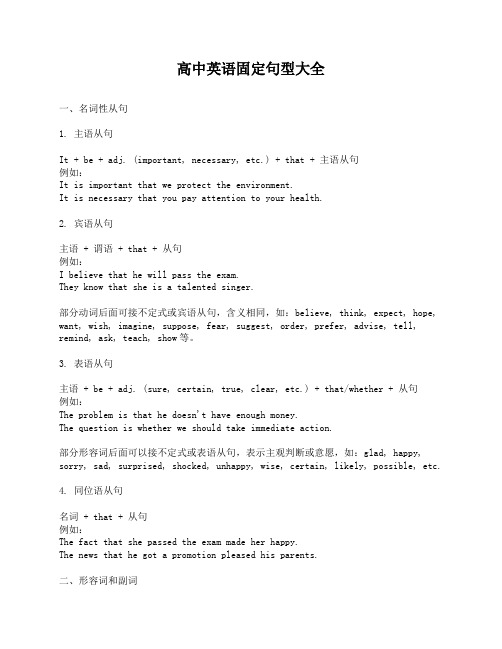
高中英语固定句型大全一、名词性从句1. 主语从句It + be + adj. (important, necessary, etc.) + that + 主语从句例如:It is important that we protect the environment.It is necessary that you pay attention to your health.2. 宾语从句主语 + 谓语 + that + 从句例如:I believe that he will pass the exam.They know that she is a talented singer.部分动词后面可接不定式或宾语从句,含义相同,如:believe, think, expect, hope, want, wish, imagine, suppose, fear, suggest, order, prefer, advise, tell, remind, ask, teach, show等。
3. 表语从句主语 + be + adj. (sure, certain, true, clear, etc.) + that/whether + 从句例如:The problem is that he doesn't have enough money.The question is whether we should take immediate action.部分形容词后面可以接不定式或表语从句,表示主观判断或意愿,如:glad, happy, sorry, sad, surprised, shocked, unhappy, wise, certain, likely, possible, etc.4. 同位语从句名词 + that + 从句例如:The fact that she passed the exam made her happy.The news that he got a promotion pleased his parents.二、形容词和副词1. 形容词的比较级和最高级比较级:主语 + be (am, is, are) + 形容词比较级 + than + 被比较的对象例如:She is taller than her sister.This book is more interesting than that one.最高级:主语 + be (am, is, are) + the + 形容词最高级 + 名词例如:He is the tallest boy in his class.This is the most beautiful painting I have ever seen.2. 常用的形容词和副词beautiful, handsome, pretty, ugly, lovely, attractive, stunning, gorgeous, charming, cute, elegant, fashionable, stylish, glamorous, delightful, etc.good, great, excellent, wonderful, fantastic, fabulous, amazing, awesome, splendid, terrific, marvelous, etc.bad, terrible, awful, horrible, unpleasant, etc.expensive, cheap, reasonable, affordable, etc.fast, slow, quick, rapid, swift, etc.loud, quiet, noisy, etc.hard, easy, difficult, challenging, simple, complicated, complex, etc.high, low, tall, short, long, big, small, huge, tiny, etc.young, old, new, ancient, modern, etc.3. 形容词和副词的用法形容词可修饰名词,也可作表语副词一般修饰动词、形容词或其他副词三、倒装句1. 完全倒装句在以下情况下要使用完全倒装句:a) 句首为表示地点、方式等的介词短语时例如:Under the tree were two cats.In this way, we can solve the problem.b) 句首为表示方位的副词或介词短语时例如:Here comes the bus.Out rushed the students.c) 句首为表示否定、副词only、hardly, seldom, never等时例如:Never have I seen such a beautiful sunset.Not only does he play the piano well, but he also sings well.d) 句首为so, neither, nor时例如:So busy was he that he forgot to eat lunch.Neither do I like English, nor do I like math.2. 部分倒装句在以下情况下要使用部分倒装句:a) 句首为表示条件的介词短语时例如:Should you need any help, please let me know.Had I known your address, I would have sent you a postcard.b) 句首为表示时间的介词短语或副词短语时例如:At no time should you give up your dream.On no account can he stay out late.四、虚拟语气1. 条件句中的虚拟语气a) “与事实相反的条件句”:如果对过去的情况进行虚拟,主句要用“动词的过去完成时”,从句用“动词的过去完成时”或“would/could/might + have + 过去分词”的形式。
(完整)高中英语主要要掌握三大从句

高中英语主要要掌握三大从句。
分别是:1、定语从句(形容词从句)2、名词词从句(包括主语从句,宾语从句,表语从句,同位语从句)3、状语从句(副词性从句,包括时间,地点,结果,目的,原因等)一、定语从句:定语从句(Attributive Clauses)在句中做定语,修饰一个名词或代词,被修饰的名词,词组或代词即先行词。
定语从句通常出现在先行词之后,由关系词(关系代词或关系副词)引出。
1、关系代词引导的定语从句关系代词所代替的先行词是人或物的名词或代词,并在从句中充当主语、宾语、定语等成分。
关系代词在定语从句中作主词保持一致。
(1), who, whom, that这些词代替指人,“whom”作宾语指人,“that”既可作主语又可作宾语(作宾语可以省略),可以指人也可以指物。
(2),Which 用来指人或物(用作主语、宾语,作宾语时可以省略)(3),whose“whose”表示谁(可以为人也可以为物)的(东西)2、关系代词引导的定语从句(1),关系副词why主要用于修饰表示原因的名词(主要是the reason),同时它在定语从句中用作原因状语。
(2),关系副词when主要用于修饰表示时间的名词,同时它在定语从句中用作时间状语。
(3),关系副词where主要用于修饰表示地点的名词,同时它在定语从句中用作地点状语。
3、非限制性定语从句它起补充说明作用,缺少也不会影响全句的理解。
在非限制性定语从句的前面往往有逗号隔开。
二、名词性从句在句子中起名词作用的句子叫名词性从句(Noun Clauses)。
名词性从句的功能相当于名词词组, 它在复合句中能担任主语、宾语、表语、同位语、介词宾语等,因此根据它在句中不同的语法功能,名词性从句又可分别称为主语从句、宾语从句、表语从句和同位语从句。
引导名词性从句的连接词可分为三类:1、连词(5个):that (宾语从句或表语从句中that有时可以省略)whether,if (均表示“是否”表明从句内容的不确定性)as if ,as though (均表示“好像”,“似乎”)以上在从句中均不充当任何成分2、连接代词(9个):what, whatever, who, whoever, whom, whomever, whose, which, whichever3、连接副词(7个):when, where, how, why, whenever, wherever, however三、状语从句状语从句(Adverbial Clause)状语从句指句子用作状语时,起副词作用的句子。
高中英语2024届高考名词性从句知识分类讲解(主语从句+宾语从句+表语从句+同位语从句)
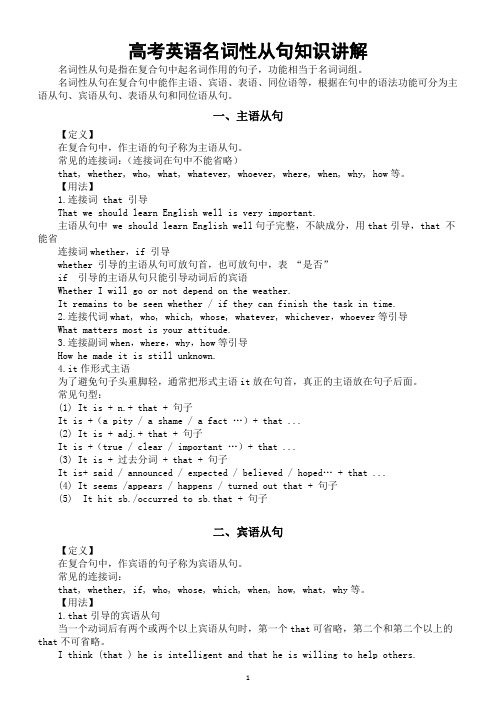
高考英语名词性从句知识讲解名词性从句是指在复合句中起名词作用的句子,功能相当于名词词组。
名词性从句在复合句中能作主语、宾语、表语、同位语等,根据在句中的语法功能可分为主语从句、宾语从句、表语从句和同位语从句。
一、主语从句【定义】在复合句中,作主语的句子称为主语从句。
常见的连接词:(连接词在句中不能省略)that, whether, who, what, whatever, whoever, where, when, why, how等。
【用法】1.连接词 that 引导That we should learn English well is very important.主语从句中 we should learn English well句子完整,不缺成分,用that引导,that 不能省连接词whether,if 引导whether 引导的主语从句可放句首,也可放句中,表“是否”if 引导的主语从句只能引导动词后的宾语Whether I will go or not depend on the weather.It remains to be seen whether / if they can finish the task in time.2.连接代词what, who, which, whose, whatever, whichever,whoever等引导What matters most is your attitude.3.连接副词when,where,why,how等引导How he made it is still unknown.4.it作形式主语为了避免句子头重脚轻,通常把形式主语it放在句首,真正的主语放在句子后面。
常见句型:(1) It is + n.+ that + 句子It is +(a pity / a shame / a fact …)+ that ...(2) It is + adj.+ that + 句子It is +(true / clear / important …)+ that ...(3) It is + 过去分词 + that + 句子It is+ said / announced / expected / believed / hoped… + that ...(4) It seems /appears / happens / turned out that + 句子(5) It hit sb./occurred to sb.that + 句子二、宾语从句【定义】在复合句中,作宾语的句子称为宾语从句。
高中英语_名词性从句
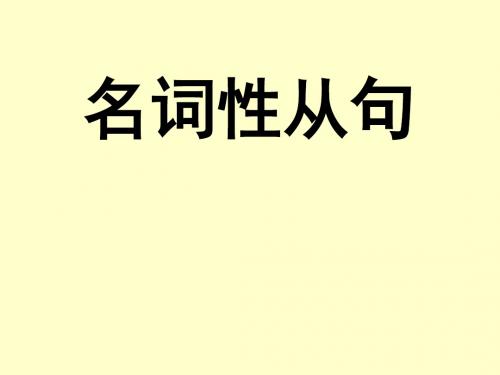
宾语从句做题思路:
断 始:空格 句 末:第二个谓语动词之前 that/whether/if 注意:陈述语序 what/who when/where/why/how 时态一致
His grandfather was among the first to settle in C _ is now a famous holiday center. A. where B. which C. what D. that
主语从句做题思路:
断 句 始:空格,末:第二个谓语动词之前
始:连接词,末:第二个谓语动词之前 空格在从句内部 that/whether/if what/who/when/where/why/how 空格在从句外部 形式主语选 It
宾语从句和表语从句
We find that even our bad days have bright moments. You can do what you want to do, have what you want to have, and be what you want to be.
first step.
B we’ll go camping tomorrow depends _ on the weather. (1996) A. If B. Whether C. That D. Where _ B you have done might do harm to other people. (1987) A. That B. What C. Which D. This
主语 从句
注意:所有句子均为陈述语序
1.That women are treated unequally in some areas is unfair. 2. He who would do great things should not attempt them all alone. 3. Who was responsible for the accident is not clear. 4.The novel which I have read twice is very touching. 5. The question is why he likes the place so much. 6. We doubt whether he is honest.
从句的知识点总结
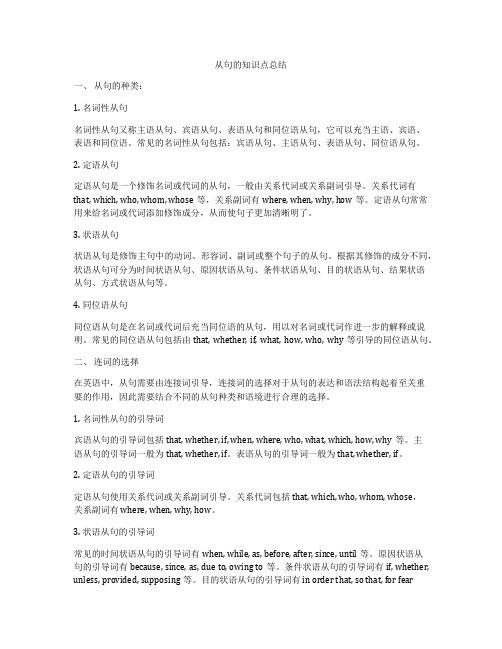
从句的知识点总结一、从句的种类:1. 名词性从句名词性从句又称主语从句、宾语从句、表语从句和同位语从句,它可以充当主语、宾语、表语和同位语。
常见的名词性从句包括:宾语从句、主语从句、表语从句、同位语从句。
2. 定语从句定语从句是一个修饰名词或代词的从句,一般由关系代词或关系副词引导。
关系代词有that, which, who, whom, whose等,关系副词有where, when, why, how等。
定语从句常常用来给名词或代词添加修饰成分,从而使句子更加清晰明了。
3. 状语从句状语从句是修饰主句中的动词、形容词、副词或整个句子的从句。
根据其修饰的成分不同,状语从句可分为时间状语从句、原因状语从句、条件状语从句、目的状语从句、结果状语从句、方式状语从句等。
4. 同位语从句同位语从句是在名词或代词后充当同位语的从句,用以对名词或代词作进一步的解释或说明。
常见的同位语从句包括由that, whether, if, what, how, who, why等引导的同位语从句。
二、连词的选择在英语中,从句需要由连接词引导,连接词的选择对于从句的表达和语法结构起着至关重要的作用,因此需要结合不同的从句种类和语境进行合理的选择。
1. 名词性从句的引导词宾语从句的引导词包括that, whether, if, when, where, who, what, which, how, why等。
主语从句的引导词一般为that, whether, if。
表语从句的引导词一般为that, whether, if。
2. 定语从句的引导词定语从句使用关系代词或关系副词引导。
关系代词包括that, which, who, whom, whose,关系副词有 where, when, why, how。
3. 状语从句的引导词常见的时间状语从句的引导词有when, while, as, before, after, since, until等。
高中英语名词性从句课件(38张ppt)
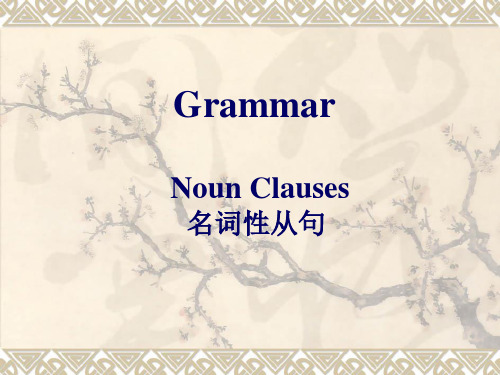
(that在从句中不充当任何成份)
The idea (that/which) he gave surprises many people.
(that在从句中作gave 的宾语)
宾语从句须注意
1) 由疑问词引导的从句中, 词序按陈述句 顺序排列。
e.g. I wonder what he is doing. 注意:I wonder what was wrong /the matter
with him. 2)当主句的谓语动词是过去时的时候, 从句的 谓语动词应用相应的过去时。自然规律和客观 真理例外。
4) That在其他名词性从句中均不可省略,只有 在宾语从句中that有时可以省略,但在并列 的宾语从句中第二个that 不可省略。
e.g. He said (that) he would leave and that he would never come back again.
5) 否定的转移 若主句谓语动词为think, consider, suppose, believe, expect, fancy, guess, 等, 其后的宾语 从句若含有否定意义, 一般要把否定词转移到 主句谓语上, 从句谓语用肯定式。 e.g. I /we don’t think this dress fits you Well, does it?
3. 连接代词: what, whatever, who, whoever, whom,whose, which(哪个): 不仅起到连接一个句子的作用,同时也是从句 的一个组成部分;从句不完整,缺成份。
高考英语定语从句100句

高考英语定语从句100句1. The man who talked to you just now is an engineer. 刚才和你说话的那个人是一位工程师。
2. This kind of book is for children whose native language is Chinese. 这种书是供母语是汉语的儿童看的。
3. I enjoyed the evening that we spent together by the sea. 我们一起在海边度过的那个晚上,我过得很愉快。
4. Here is the pen that you lost the day before yesterday. 这是你前天丢失的那支笔。
5. He is the person I met in the park yesterday. 他就是我昨天在公园里遇到的那个人。
6. The book you need is sold out. 你需要的那本书售完了。
7. The lady who came to our class is from Australia. 那位来过我们班的女士来自澳大利亚。
8. The man who shook hands with our teacher just now is Li Lei’s father. 刚才和我们老师握手的那个人是李雷的父亲。
9. I’ll never forget the summer holiday I spent with you. 我将不会忘记和你一起过的那个暑假。
10. She is one of the students in our class who are good at English. 她是我们班上英语很好的学生之一。
11. He’s the only one of my friends who comes from a foreign country. 他是我唯一一个来自外国的朋友。
- 1、下载文档前请自行甄别文档内容的完整性,平台不提供额外的编辑、内容补充、找答案等附加服务。
- 2、"仅部分预览"的文档,不可在线预览部分如存在完整性等问题,可反馈申请退款(可完整预览的文档不适用该条件!)。
- 3、如文档侵犯您的权益,请联系客服反馈,我们会尽快为您处理(人工客服工作时间:9:00-18:30)。
高中英语从句大全1)表语从句1.定义:用作表语的从句叫做表语从句。
2.构成:关联词+简单句3.引导表语从句的关联词的种类:(1)从属连词that.如:The trouble is that I have lost his address.麻烦是我把他的地址丢了。
(2)从属连词whether,as,as if.如:He looked just as he had looked ten years before.他看起来还与十年前一样。
The question is whether they will be able to help us.问题是他们是否能帮我们。
注:从属连词if一般不用来引导表语从句,但as if却可引导表语从句,如:All this was over twenty years ago,but it’s as if it was only yesterday.这都是20多年前的事了,但宛如昨天一样。
能跟表语从句的谓语动词一般为系动词be,seem,look等。
如:It looked as if it was going to rain.看起来天要下雨了。
(3)连接代词who,whom,whose,what,which,whoever,whatever,whichever 连接副词where,when,how,why.如:The problem is who we can get to replace her.问题是我们能找到谁去替换她呢。
The question is how he did it.问题是他是如何做此事的。
That was what she did this morning on reaching the attic.那就是她今晨上了阁楼干的。
解释:1.连词because可引导表语从句。
如:I think it is because you are doing too much.我想这是因为你做得太多。
2.在一些表示“建议、劝说、命令”的名词后面的表语从句中,谓语动词用虚拟语气。
should+动词原形表示,should可省略。
如:My suggestion is that we (should)start early tomorrow.我的建议是我们明天一早就出发。
表语从句练习题及答案1. The question is ________ we will have our sports meet next week.A. thatB. ifC. whenD. whether2.The reason why he failed is ________he was too careless.A. becauseB. thatC. forD. because of3. Go and get your coat. It’ s ________you left itA. whereB. thereC. there whereD. where there4.The problem is _________to take the place of TedA. who can we getB. what we can getC. who we can getD. that we can get5. What I want to know is ______ he likes the gift given by us.A. thatB. ifC. whetherD.不填6. The reason is_________I missed the bus.A. thatB. whenC. whyD. what7. That is __ ___ we were late last time.A. thatB. whenC. whyD. what8. She looked _________ she were ten years younger.A. thatB. likeC. asD. as though9.—I fell sick!--I think it is _______ you are doing too much.A. whyB. whenC. whatD. because10. The reason why he hasn’t come is ___________.A. because his mother is illB. because of his mother’s being illC. that his mother is illD. for his mother is ill11. —He was born here.-- That is _______ he likes the place so much.A. thatB. whatC. whyD. how12.That is ______ Lu Xun once lived.A. whatB. whereC. thatD. whythat/what的区别1._______your father wants to know is________ getting on with your studies.A. What; how are youB. That;how you areC. How;that you areD. What;how you are2. The trouble is__________we are short of tools.A. whatB. thatC. howD. why that3. America was __________was first called “India” by Columbus.A. whatB. whereC. the placeD. there where4. China is becoming stronger and stronger. It is no longer_________ .A. what it used to beB. what it was used to beingC. what it used to beingD. what it was used to be5. ________he really means is ________he disagrees with us.A. What … thatB. That … whatC. What … whatD. That … what6. The energy is ________ makes the cells able to do their work.A. thatB. whichC. whatD. such高考练习1 —I drove to Zhuhai for the air show last week .—Is that_____ you had a few days off?(NMET1999)A. why B .what C. when D. where2 .I had neither a raincoat nor an umbrella ____I got wet through. (1998 上海)A. It’s the reason B. That’s why C. There’s why D. It’s how3. See the flags on top of the building? That was ______ we did this morning. (06 全国)A. when B. which C. where D. what4. --- Are you still thinking about yesterday’s game?(2003北京春)---Oh, that’s _____.A. what makes me feel excitedB. whatever I feel excited aboutC. how I feel about itD. when I feel excited5. What surprised me was not what he said but ______ he said it.(2004湖北)A. the wayB. in the way thatC. in the wayD. the way which答案 DBACCACDDCCBthat/what的区别 DBAAAC高考练习ABDAA2)主语从句1.定义:用作主语的从句叫做主语从句。
2.构成:关联词+简单句3.引导主语从句的关联词有三类:(1)从属连词that.如:That they were in truth sisters was clear from the facial resemblance between them.很明显,她们确是亲姐妹,她们的脸型很相似。
(2)从属连词whether.如:Whether he’ll come here isn’t clear.他是否会来这里还不清楚。
(3)连接代词who,whom,whose,what,which,whoever,whatever,whichever 连接副词where,when,how,why.如:What she did is not yet known.她干了什么尚不清楚。
How this happened is not clear to anyone.这事怎样发生的,谁也不清楚。
Whoever comes is welcome.不论谁来都欢迎。
Wherever you are is my home —— my only home.你所在的任何地方就是我的家——我唯一的家。
解释:1.主语从句能用it作形式上的主语。
常以it作形式主语的句型有:A.It+be+形容词(obvious,true,natural,surprising,good,wonderful,funny,possible,likely,certain,probable,etc.)+that从句。
如:It is certain that she will do well in her exam.毫无疑问她考试成绩会很好。
It is probable that he told her everything.很可能他把一切都告诉她了。
B.It+be+名词词组(no wonder,an honor,a good thing,a pity,no surprise,etc.)+that 从句。
